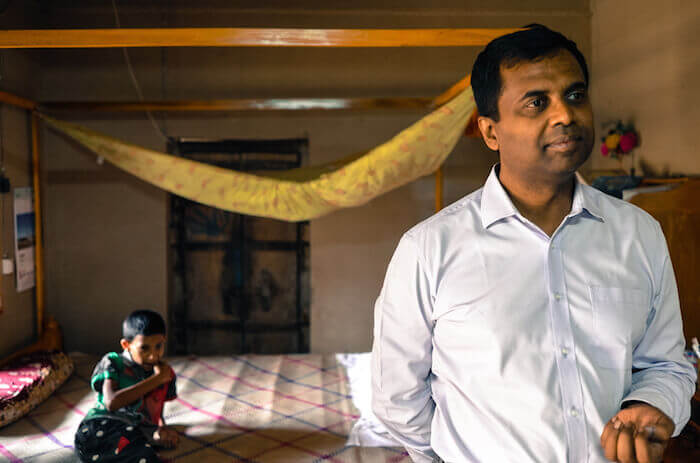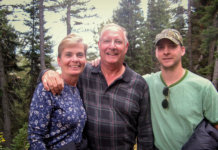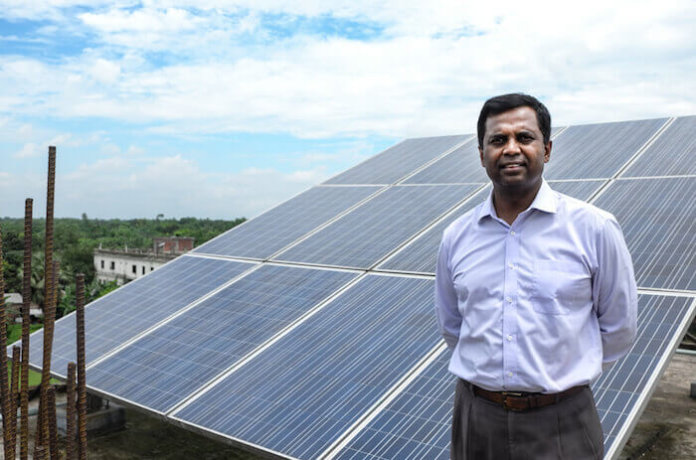
Interview with Solaric founder Didar Islam
Imagine paying for utilities with your mobile device or powering your home via clean, renewable solar energy. Didar Islam and his company Solaric has not only managed to create a growing company selling such systems, but did so in places such as rural Bangladesh and Tanzania that don’t even have access to electricity. Tharawat spoke with Didar about how he achieved innovation-driven growth and what it means to be a Sustainable Social Business.
Didar Islam was by all accounts a successful engineer. After graduating with honors from Bangladesh University of Engineering and Technology and obtaining a masters degree in electrical engineering at the University of Florida, Islam worked as a prominent designer of analog IC chips in the United States. By 1996, he invented the first single-chip radio that revolutionized low-cost RF link and was used in millions of garage door openers across America. Then in 2009, Islam returned to his native Bangladesh where he founded a company called Power IC and began designing analog IC chips to sell in the Mainland Chinese market.
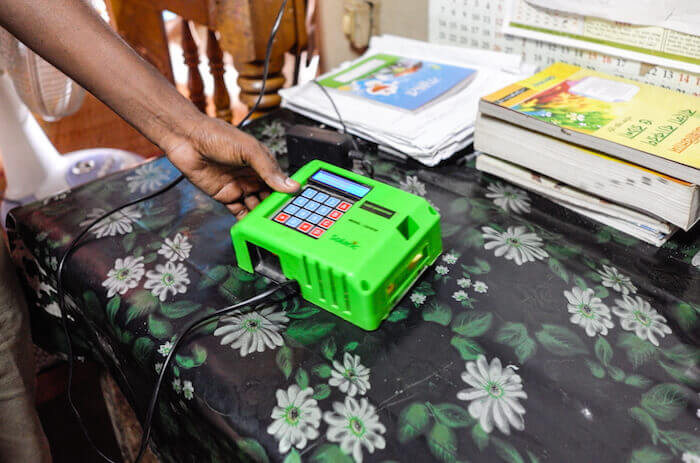
The Invention of the 20-Year Light Bulb
One day, Didar was approached by BRAC, the world’s largest NGO. “BRAC was working with something called the Solar Home System (SHS), which was made up of a solar panel, a battery, and a couple of lights,” he says. “They were distributing these systems to provide light for homes in Bangladesh’s off-grid rural areas where they had no electricity. People would charge the battery during daytime with the solar panel, and use the battery to power the lights at night.”
Didar took one look at the SHS and realized that it was a very primitive system. “Why use a 12V battery solution? Why not come up with something utility grade so you could power anything you want to, instead of just light bulbs?” he wondered. BRAC proposed that if Didar could come up with a better solution, they would integrate it into the SHS.
Although Didar did not have any background in solar energy, he began to realize that what they were talking about was a solution for a huge market. “In Bangladesh alone, more than 50% of the population lives in rural off-grid areas, meaning there are 20 million homes living without electricity. At the time, BRAC and other NGOs were distributing around 10,000 Solar Home Systems per month, so if I could come up with an improvement, the impact would be massive.”
Upon this realization, Didar began R&D work through Power IC. Within a year, he developed 2 revolutionary devices. “The first device was called the Optimizer, a device that could convert the 12V battery to a utility grade voltage (120V) without any loss. This meant that if the Optimizer was added to the Solar Home System, people could use the system to power any home appliance including their mobile phones,” he explains. “We also invented the driver-less LED Lamp, a low-cost LED light bulb that offers true LED life, which is 50,000 hours. With the driver-less LED Lamp integrated into the SHS, a family could theoretically light their home for 20 years.”
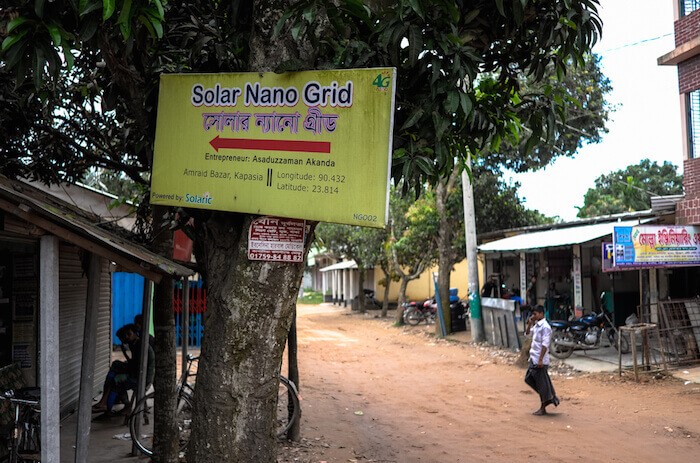
Solaric – Clean, Affordable Solar Energy for Rural Bangladesh
When Didar presented BRAC with these two inventions, the NGO was thrilled. “BRAC instantly signed us on a 6-month deal in which we would be an exclusive component supplier of BRAC’s Solar Home System by providing them with the Optimizer and LED lamp.”
“I realized that this would require a full-scale operation, but there were no government initiatives, policies, nor support mechanisms that could provide funding for the operation. I then reached out to the International Finance Corporation (a member of the World Bank), who explained that they had just established a Small Enterprise Assistance Fund (SEAF), which was designed to provide funding for this sort of enterprise. We eventually became SEAF’s first investment project and secured $1 million in funding, with which we set up a factory and head office in Dhaka. This was the beginning of Solaric.”
For 6 months, Solaric successfully delivered thousands of Optimizers and LED Lamps for BRAC’s Solar Home Systems. After the exclusive contract expired, the company expanded its reach to more than 50 NGO networks throughout rural Bangladesh who were selling solar power systems like BRAC. Today, Solaric supplies 10,000 systems per month.
Furthermore, Didar discovered a new market. “Of the 20 million homes who are without electricity, 3.7 million had already received the SHS systems from NGOs in the past, but 80% of them were using the antiquated 12V system that were distributed before we invented the Optimizer and driver-less LED Lamp. We came up with the idea to sell upgrades so that customers with the 12V system could make the transition to our systems.” Didar estimates that even with Solaric’s current volume, it would take 20 years to upgrade all of the antiquated Solar Home Systems. The discovery of this market was a lucrative success, and Solaric’s upgrade business now makes up 30-35% of its total revenue.
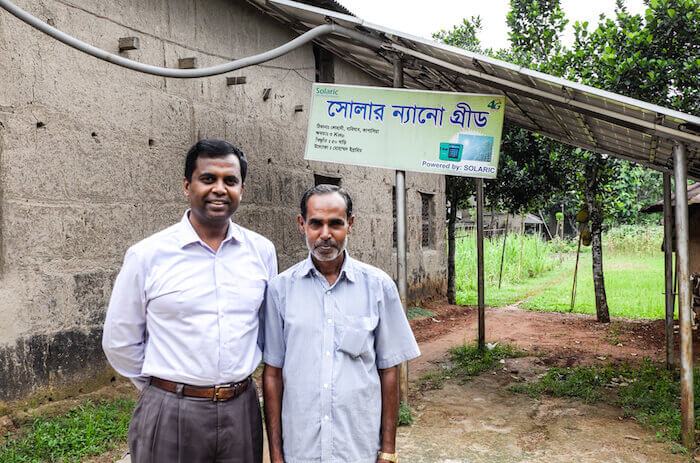
Success in the International Market
In 2013, Solaric began its international expansion. “Globally, there are 1.8 billion people who are without electricity,” says Didar. “The international markets may be different culturally, economically, and politically, but people who live in those off-grid areas need electricity now, and we can provide that.”
Solaric’s first export markets were Tanzania and India. In these countries, Solaric formed a joint venture with a local partner, where it supplies the Solar Home System components and the partner sells the SHS in the market.
However, Didar quickly realized that many people in these off-grid areas had difficulty paying the full price of the SHS in cash. That was when Solaric developed a revolutionary mobile credit payment system known as “code lock” which they began testing in Tanzania.
“When a customer purchases the SHS device, they make a 30% down payment,” Didar explains. “Then the customer pays a monthly installment of around $5 dollars via mobile phone through a mobile payment gateway called M-Pesa, a very commonly used payment service in Tanzania. When the customer sends the payment, they receive a code via SMS, which they can input into their SHS device using a TV remote controller. This code allows the device to run for 30 days. The customer can then repeat this process monthly until the remaining balance for the SHS is completely paid off.”
Thanks to this mobile credit payment system, Solaric has seen business take off in Tanzania as well as India and plans to expand its operations throughout Africa and South Asia.
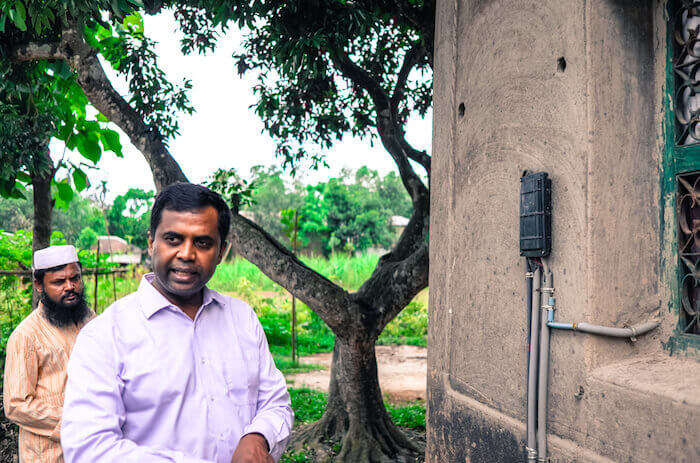
Creative Solutions
Back in his home country of Bangladesh, Solaric faced another challenge. Of the 20 million homes without electricity, 60% could not even make the $5 monthly payment, making the Solar Home System unaffordable to a large number of off-grid residents. To address this issue, Solaric developed the Solar Nano Grid.
“The Solar Nano Grid is a low cost, high efficiency DC (220V) solar grid system that hooks up 50 homes,” Didar explains. “Basically, a local entrepreneur in an off-grid area purchases the Nano Grid for a community. Then every month, the entrepreneur makes a monthly payment via the mobile payment system to purchase electricity in bulk, which he sells to the connected homes using a pay-per-use system. Under this Nano Grid system, the monthly cost per home can be reduced to $2 dollars, bringing affordable electricity to homes that might otherwise not have access to solar energy.” According to Didar, the Nano Grid has become a very popular solution and Solaric recently partnered with an Indian bank that will power its 1,500 rural branches using the Nano Grid system.
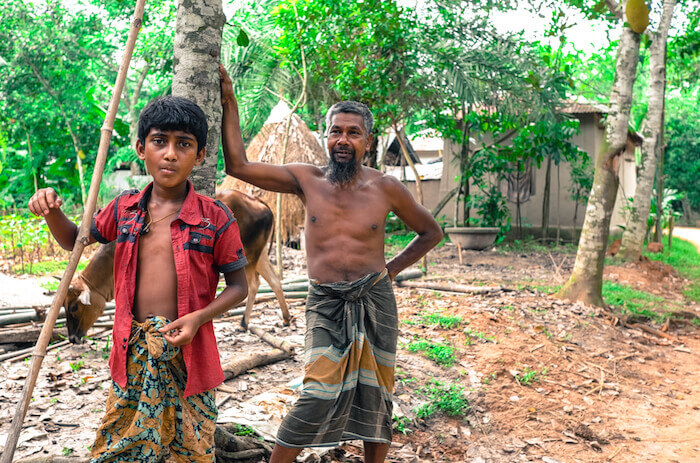
Achieving Growth Through Practical Innovation
Solaric’s success is largely attributed to its culture of innovation that has not only birthed new technology, but also opened up market opportunities. How has it managed to maintain such an innovative edge? “I have a 20 year R&D background, so every time I see something, I think about what can be done to make it more efficient,” Didar says. “To me, efficiency is the most important element. At Solaric we try to make everything we do more efficient, and that requires innovation.”
To illustrate this, he gives an example. “My head office in Dhaka must work with 100 rural branches that are in the field. At any given moment, the head office knows where the branch staff is, the customers they have visited, and their travel expenses, thanks to a mobile branch management system. Now the amount of work that used to take 10 people to manage is down to 1. In other words, sales efficiency has increased 10 fold.”
Didar revealed that this branch management system was created in-house to address Solaric’s specific needs. “Solaric does not use Enterprise Resource Planning (ERP) systems because I believe that they are top-down approach where some design team in Silicon Valley dictates how things should be done in business. I am heavily opposed to this. I always say that processes must be developed based on the needs on the ground. The question is, how do you do that?”
“First, we identify issues in our business processes. Then we develop a basic solution in Excel using visual basic and macros. Once the Excel system is built, we begin implementing it and measure how well it works. After about a week of modifications, the Excel system is built into a piece of software by our team of in-house software developers who I hired specifically for this function. In one month, I now have a new process system up and running, which I immediately implement company-wide. This is how the mobile branch management system was created, and this is how we continue to develop around 10 new processes for efficiency per month.”

The Sustainable Social Business
For Didar, Solaric’s success represents a paradigm shift in how he believes companies should operate in non-traditional markets such as off-grid rural areas. “I will feel a sense of accomplishment when everyone in the world who are living off-grid is somehow benefiting from our work,” he says. “Traditionally, the off-grid people were only served by NGOs. But NGOs are social services so they lack technological innovation. Furthermore, NGOs are project-oriented meaning they are not sustainable in the long-term. On the other hand, companies in urban areas are the ones with the R&D capacity to develop new technologies and run a sustainable operation. But they don’t understand the needs of off-grid areas and find it unappealing to do business there because they are largely profit-oriented.”
“My mission is to combine the best of both worlds – we can take up an NGO-driven social cause such as off-grid electricity but operate with a sustainable, profitable model as a company would. This model is called the ‘Sustainable Social Business’, and that is my vision for Solaric. When you look at the huge population living off-grid, they need something better. And that will not come from NGOs alone, and it will not come from companies alone. It will come from Sustainable Social Businesses.”
